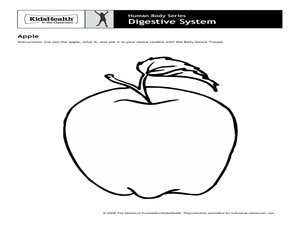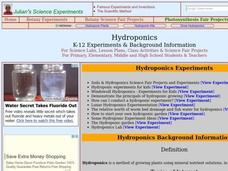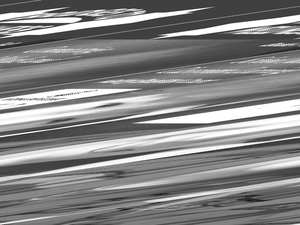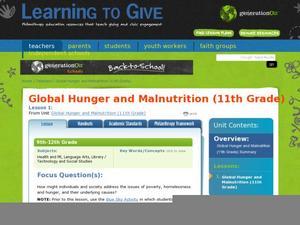Curated OER
What Happens to the Food You Eat? The Digestive System
Students observe a video displaying body parts and functions of the digestive system. They make drawings of the digestive system from their observations. They act out a short play involving body parts.
Curated OER
Human Body Series - Digestive System
With articles entitled, "What's Puke?" and "What is a Fart?" this digestive system lesson is sure to be a gas! Elementary anatomists do a belly dance to illustrate how food moves through the digestive system and then design a board game...
Curated OER
Lab Experiments in Nutrition
Looking for authentic hands-on nutritional experiments? High schoolers will perform experiments to test for the presence of vitamin C in several solutions as well as the effect of caffeine on Daphnia. They will also consider the...
Curated OER
Food and the Digestive System
Students investigate the digestive system. In this human biology lesson, students read an article about the digestive system and go onto a suggested website to review what they have learned. Students are asked questions as an assessment.
Utah Education Network (UEN)
Balanced Diet
Second graders investigate the concept of a balanced diet and how the food pyramid is organized. They conduct research using the links included in the instructional activity. They differentiate the parts of the pyramid while looking at...
Curated OER
Food for Thought: Hunger???Around the Block, Around the World LESSON 2: Local Hunger and Malnutrition
Students examine the difference between hunger and malnutrition. They study the idea of hunger as a theme in literature while discovering how communities can solve hunger problems.
Curated OER
Health: Basic Minerals
Students examine minerals as food nutrients and discover their importance as food sources in the diet. Among the learning options are completing worksheets, creating recipes, making billboards, and actually preparing some recipes rich...
Curated OER
Hydroponics
Students examine how to grow plants using a hydroponic system. In this hydroponics lesson students identify the advantages and disadvantages of growing plants hydrologically.
Curated OER
They Don't Just Eat Grass
Students consider the USDA daily recommendations to create a "feed" product for middle schoolers. In this Health lesson, students learn about the ingredients in feed that is fed to livestock and apply the method to creating feed rations...
Curated OER
Marine & Aquatic Habitats Activities - Terrestrial Forests vs. Kelp Forests
Middle schoolers discuss concept and specificity of habitats, both marine and terrestrial, list similarities and differences in the habitats of a kelp forest and a terrestrial forest, compare types of organisms that occupy corresponding...
Curated OER
Connecting School Meals and Classroom Learning Making Breakfast Count
Students investigate the significance of a healthy breakfast. In this nutrition activity, students participate in an activity that enables them to assess their own eating patterns. Students also analyze breakfast menus to determine...
Aquarium of the Pacific
Ecosystem Comparison
Fifth graders examine plants and animals in two ecosystems and compare them. In this ecosystem survival lesson, 5th graders compare and contrast a coral reef and kelp forest ecosystem. Students investigate the abiotic and biotic...
Curated OER
Connecting School Meals to Classroom Learning
Students examine the impact of dairy nutrients. In this nutrition instructional activity, students participate in interactive activities that require them to consider how much calcium their bodies need. Students also visit the school...
Curated OER
Jr. Chef Club Delightful Desserts
Students identify the fat content in foods. In this nutrition lesson plan, students review the food pyramid and identify foods that are low in fat. Students create a low-fat dessert by using fruit.
May Media Group
Treatment Plants
Young scientists explore nature's water treatment plants in this simple science demonstration. By placing a stalk of celery in a cup of water mixed with food coloring, children are able to observe how plants absorb nutrients and...
Curated OER
Dinnertime for Animals
Is a deer an herbivore? What about a spider? Experiment with the food chain in an interactive science experiment. After listing the herbivores from a selection of animals, third and fourth graders compare the skulls and teeth of...
Curated OER
AP: Chapter 41: Animal Nutrition
Ms. Foglia has created another comprehensive biology worksheet that you can use with your advanced learners. The topic is animal nutrition and the digestive system. Questions address nutrients and deficiencies, stages of food processing,...
Curated OER
Global Hunger and Malnutrition
Is there a difference between hunger and malnutrtion? Is this a problem only in third world countries? How does hunger and malnutrition affect the community? Why do these problems exist when the world produces enough food to feed...
New South Wales Department of Education
Photosynthesis
Venus fly traps photosynthesize and consume insects because the soil they live in does not provide enough nutrients. Scholars analyze historical scientific experiments to learn how scientists discovered photosynthesis. From their...
Curated OER
Fun Faces of Wisconsin Agriculture: Curley's Beef Fast Facts
Students explore animal slaughter by researching the Wisconsin beef industry. In this meat statistics lesson, students practice using different math functions to identify how many burgers or sports equipment can be made from one...
ProCon
Milk
Milk: It does a body good ... or does it? Using the provided website, scholars sort through information to answer the question. They review a chart demonstrating lactose intolerance by ethnicity and region, and they also compare the...
NOAA
Ocean Zones
How can organisms light up in water? Bioluminescence is light produced in a chemical reaction that can occur in an organism's body. First, learners determine what happens to light/color as you move into the deep ocean. In groups, they...
Curated OER
Nutrition: Why do we need rice in our diet?
Second graders discover what the Food Guide Pyramid represents. In this health lesson, 2nd graders experience the types of foods represented in each of the groups found in the pyramid. As part of this lesson, students discover one food...
Curated OER
Mission Meals
High schoolers engage in a investigation of the types of meals that astronauts eat in space while examining the types of nutritional elements needed for optimum physical tasks in space. They are given different foods and then document...
Other popular searches
- Nutrients in Food
- Six Food Nutrients
- Six Nutrients in Food
- Basic Food Nutrients
- 6 Nutrients in Food
- Food Nutrients Cycle
- Test for Food Nutrients
- Nutrients & Food Label
- Testing for Food Nutrients
- Major Food Nutrients
- Food Nutrients Cross Words























